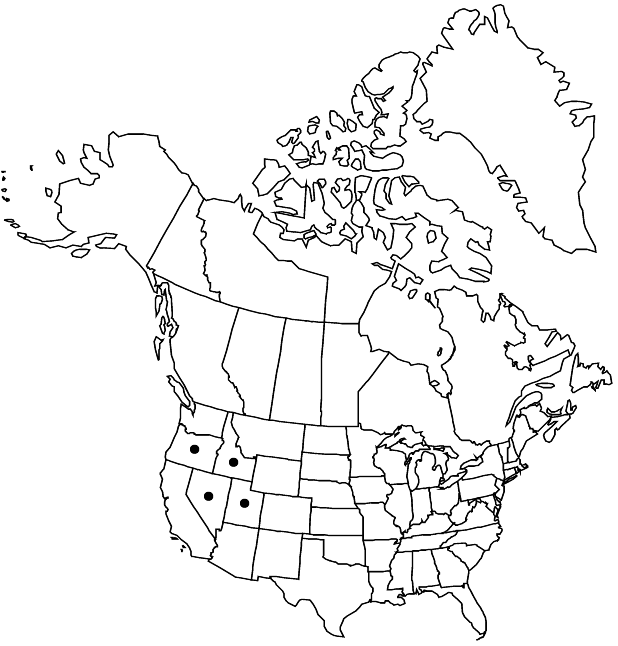Primula cusickiana
in A. Gray et al., Syn. Fl. N. Amer. ed. 2, 2: 399. 1886,.
Plants (3–)5–10 cm, herbaceous; rhizomes short, stout; rosettes not clumped; vegetative parts only slightly farinose on calyx. Leaves not aromatic, indistinctly petiolate; petiole winged; blade without deep reticulate veins abaxially, lanceolate to spatulate, 1–4 × 0.3–1.8(–2.3) cm, thick, margins almost entire or somewhat dentate, apex obtuse or acute, surfaces glabrous. Inflorescences 2–8-flowered; involucral bracts plane, unequal. Pedicels erect to arcuate, thin, 2–25(–35) mm, length ca. 1–2 times bracts, flexuous. Flowers heterostylous; calyx green, sometimes with farinose stripes on ridges, narrowly campanulate, 5–11 mm; corolla rose to magenta-violet, tube 7–14 mm, length 1–2 times calyx, glandular or eglandular, limb to 10–25 mm diam., lobes 5–10 mm, apex emarginate. Capsules ovoid, length 1 times calyx. Seeds unknown.
Distribution

Idaho, Nev., Oreg., Utah
Discussion
Varieties 4 (4 in the flora).
Throughout the Great Basin and Intermountain Region, Primula cusickiana exhibits local variation. With the exception of P. capillaris, the members of the P. cusickiana complex are treated as varieties distinguished somewhat arbitrarily by morphological differences; geographic distribution and ecology also separate them. Genetic studies using nuclear ITS and ETS sequences, cpDNA and AFLPs (S. Kelso et al. unpubl.; A. R. Mast et al. 2004) support the close relationships in this clade and to P. capillaris. This infraspecific taxonomic recognition does not diminish their biological importance as isolated endemics almost certainly relictual from the last Ice Age and now restricted to diminishing alpine habitat islands of the Intermountain Region. Given their limited distributions and habitat, which is often threatened by climatic or anthropogenic factors, all representatives of this complex should be considered of conservation concern.
Selected References
Lower Taxa
Key
| 1 | Plants glabrous except for white farina on involucral bracts and calyces | > 2 |
| 1 | Plants glandular-pubescent, at least in inflorescences, white-farinose on involucral bracts and calyces | > 3 |
| 2 | Corolla tube length 1-1.5 times calyx. | Primula cusickiana var. cusickiana |
| 2 | Corolla tube length usually ca. 2 times calyx. | Primula cusickiana var. maguirei |
| 3 | Corolla tube length 1.5+ times calyx, 8-14 mm. | Primula cusickiana var. domensis |
| 3 | Corolla tube length to 1.5 times calyx, 7-10 mm. | Primula cusickiana var. nevadensis |